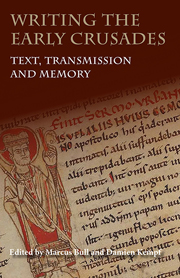Book contents
- Frontmatter
- Contents
- Acknowledgements
- List of Contributors
- List of Abbreviations
- Introduction
- Baldric of Bourgueil and the Familia Christi
- Guibert of Nogent, Albert of Aachen and Fulcher of Chartres: Three Crusade Chronicles Intersect
- Understanding the Greek Sources for the First Crusade
- The Monte Cassino Tradition of the First Crusade: From the Chronica Monasterii Casinensis to the Hystoria de via et recuperatione Antiochiae atque Ierusolymarum
- Nova Peregrinatio: The First Crusade as a Pilgrimage in Contemporary Latin Narratives
- What Really Happened to Eurvin de Créel's Donkey? Anecdotes in Sources for the First Crusade
- Porta Clausa: Trial and Triumph at the Gates of Jerusalem
- The Historia Iherosolimitana of Robert the Monk and the Coronation of Louis VI
- Towards a Textual Archaeology of the First Crusade
- Robert the Monk and his Source(s)
- Rewriting the History Books: The First Crusade and the Past
- The Ideal of Knighthood in English and French Writing, 1100–1230: Crusade, Piety, Chivalry and Patriotism
- Index
What Really Happened to Eurvin de Créel's Donkey? Anecdotes in Sources for the First Crusade
Published online by Cambridge University Press: 05 May 2014
- Frontmatter
- Contents
- Acknowledgements
- List of Contributors
- List of Abbreviations
- Introduction
- Baldric of Bourgueil and the Familia Christi
- Guibert of Nogent, Albert of Aachen and Fulcher of Chartres: Three Crusade Chronicles Intersect
- Understanding the Greek Sources for the First Crusade
- The Monte Cassino Tradition of the First Crusade: From the Chronica Monasterii Casinensis to the Hystoria de via et recuperatione Antiochiae atque Ierusolymarum
- Nova Peregrinatio: The First Crusade as a Pilgrimage in Contemporary Latin Narratives
- What Really Happened to Eurvin de Créel's Donkey? Anecdotes in Sources for the First Crusade
- Porta Clausa: Trial and Triumph at the Gates of Jerusalem
- The Historia Iherosolimitana of Robert the Monk and the Coronation of Louis VI
- Towards a Textual Archaeology of the First Crusade
- Robert the Monk and his Source(s)
- Rewriting the History Books: The First Crusade and the Past
- The Ideal of Knighthood in English and French Writing, 1100–1230: Crusade, Piety, Chivalry and Patriotism
- Index
Summary
Just before the climactic battle in the Chanson d'Antioche, the author breaks off into a hundred-line account about a donkey. The animal belongs to Eurvin de Créel. One morning Eurvin goes off to Mass. His best friend Pierre Postel is watching narrowly. He has several squires to feed and nothing to give them. End of the road for the donkey, which is turned into kebabs. Eurvin returns to find no donkey and a smell of roasting meat. There is a quarrel with Pierre followed by a tearful reconciliation. The two go into the battle as best friends and we hear nothing more of them.
This is a particularly striking example of the anecdotes contained in crusade sources, where a particular episode and/or character stands out for a moment against the collectivized heroism of the crusade. Anecdotes are found from the earliest sources for the crusade through to its depiction in the Old French Crusade Cycle in the early years of the thirteenth century. It is hard to tie these anecdotes down to any one source, and it is tempting to assign them to a loosely defined category known as ‘personal anecdote and tradition’. This paper offers some thoughts on what anecdotes are and how valuable or otherwise they are to our understanding of the events and perceptions of the First Crusade. There are three parts. The first offers a definition of anecdotes and sets out a typology of their use in First Crusade sources.
- Type
- Chapter
- Information
- Writing the Early CrusadesText, Transmission and Memory, pp. 75 - 88Publisher: Boydell & BrewerPrint publication year: 2014



